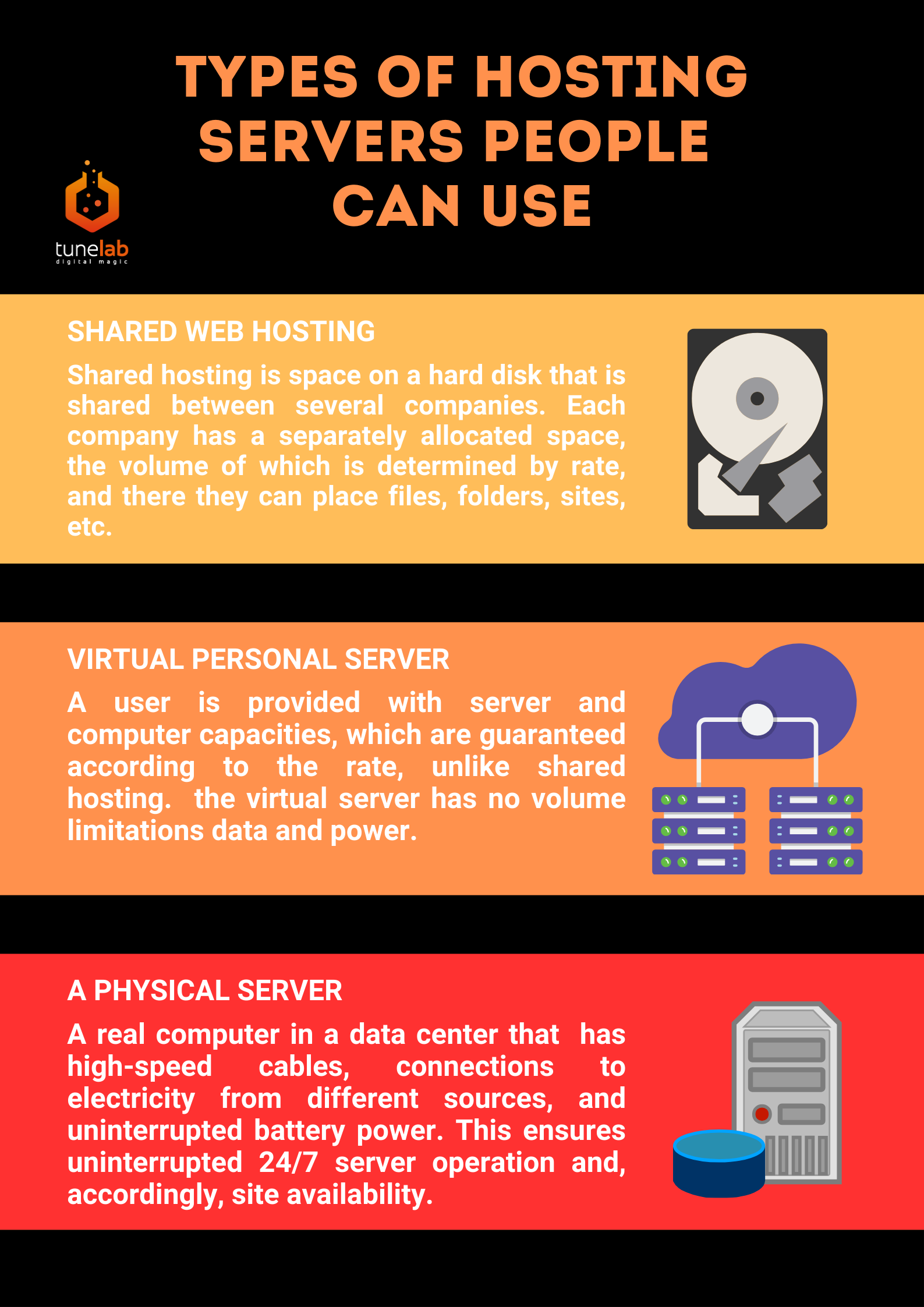To briefly explain such a concept as web hosting, it is usually understood as a service for providing the necessary space and resources for placing websites on the Internet. Web hosting gives to professional web developers a technical base for their projects and affects their performance and security.
In this blog post, we will take a closer look at the main types of web hosting, their advantages and disadvantages, and mention the most popular web hosting services we use most often in our work.
What is Web Hosting? Services Explained for Websites
Hosting is the server where the files and folders of the Internet project are stored. Usually, servers are located in a data center. Various companies that own websites or have their servers (physical computers or virtual servers) rent them or resell hosting to other companies.
One example of a company that sells its servers is Amazon (AWS), which even owns its data centers. They have data centers with their servers, where they store all the customers’ files. And, thus, they can provide the services of this hosting.
Types of Web Hosting Services: Exploring Your Options
Shared Web Hosting
Shared hosting is space on a hard disk that is shared between several companies. Each company has a separately allocated space, the volume of which is determined by rate, and there they can place files, folders, sites, etc.
Shared hosting is quite cheap, so many companies use this type of hosting. But this solution has a serious drawback. The fact is that one server has a certain capacity/resources, which sometimes may not be enough for all sites located on it. Shared hosting is called shared exactly because you as a client share server resources with other clients. For example, one site can use more resources, and sometimes these resources are not enough for another site, which will work slower. This is one of the main disadvantages of shared hosting.
Virtual Private Server (VPS)
Another type of hosting is VPS (virtual hosting). A user is provided with server and computer capacities, and they, unlike shared hosting, are guaranteed in accordance with resources purchased. So if the buyer purchased one gigahertz of the processor resource, 256 gigabytes of RAM, and there are 5 gigabytes of memory on the hard disk, then this volume is guaranteed and the client will receive exactly what he purchased.
We use a virtual server to develop our web projects. Virtual servers are more expensive than shared hosting, but in addition to the promised capacity, they have several other main advantages. First, virtual servers are more stable. For each virtual server, there is a defined amount of memory, regular memory, where client files and folders are stored, and for each client, there is a specific capacity. That is, regardless of how much is consumed by neighboring sites that also use virtual hosting and that are also located on this server. Regardless of how much they use, the customer always receives resources which were purchased, but no more.

Physical dedicated server
A dedicated physical server is a physical computer in a data center that is owned by a company that pays rent for it. Among the main advantages of locating a dedicated server in the data center, we can highlight the fact that they have several Internet channels using high-speed optic cables. High-quality data centers have several connections to electricity from different sources in case of emergency power outages, then backup sources are used. In addition, the data center has uninterrupted battery power and a generator. This ensures uninterrupted 24/7 server operation and, accordingly, site availability. That is, the client who owns this server owns it solely and all resources belong to them. But this is the most expensive solution.
Why, for example, can’t you use your home computer as a server for your site? In this case, the home PC must work constantly, 24/7, but it is not designed for this, unlike a special server with well-thought-out ventilation and cooling systems and microcircuits that can withstand a round-the-clock load. This also includes cooling the rooms of the premises where it is located.
Essential Services for Your Website
In 90% of cases, we use AWS services because they offer a great variety of tools and virtual servers for saving project data at a favorable price. AWS contains data centers around the world and has an extensive support base for various platforms, including WordPress, Joomla, etc. AWS hosting also supports projects based on PHP, React, JavaScript, and others. In particular, AWS tools can be easily scaled and configured for current traffic. You can read more about Amazon Web Services in general in one of our previous blog posts.
Another hosting service that we use for less important projects is Digital Ocean. Like AWS, this hosting service belongs to virtual private hosting and has data centers located in major cities like New York, London, Singapore, Toronto, Amsterdam, etc. These data centers cover the most important nodes of international traffic exchange. Also, Digital Ocean contains a lot of tools for project scaling on several projects at once.
Also sometimes we can use Google Cloud in our work. It is a set of servers that is considered one of the alternatives to AWS and includes such options for hosting as deploying sites based on WordPress, Javascript, Java, etc.
Advantages of Website Hosting
In short, using web hosting offers users several benefits, including:
- Branded email. The presence of a company’s branded e-mail indicates the professionalism and prestige of the company itself. It would seem like a rather simple and insignificant advantage, but it adds a lot of pluses to the image of the company, just like well-thought-out marketing or even the color scheme of the site. For example, companies with their own branded email command more trust from customers.
- Security of data storage. The best-known and highest-quality hosting services contain reliable data protection algorithms. These services offer protection mechanisms, such as anti-spam systems and firewalls.
- Fast operation of the site. A correctly chosen hosting service ensures fast and optimal website operation. Especially if it concerns the already mentioned virtual servers or real physical data centers that the company can rent.
- Support. By hiring a web hosting service from one of the aforementioned companies, you receive additional services for solving technical problems that may arise on the site.
Web hosting is a reliable place for the effective operation of the website, as well as the preservation and protection of the data of this website. Many companies offer their web hosting services on shared hard drives or virtual servers. Shared hosting is affordable, but not too comfortable for big projects. When several sites share the volume and power on the hard disk, these two things may not be enough for all the sites. The virtual server does not have such problems and provides the exact power and speed of the server, according to the rate. The most expensive option can be renting a physical server in a data center, which will work without interruption even during emergency shutdowns.
A properly selected hosting service will ensure a site will have enough speed to handle peak loads and perform all the necessary functions properly. Moreover, hosting services today offer many solutions for server scaling, data protection, and additional technical support provided by the owner of the hosting service.
By choosing a web hosting service, the site owner finds a convenient solution for the operation of his site, which will satisfy all the technical and business needs of both the site owner and the site user.



